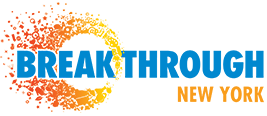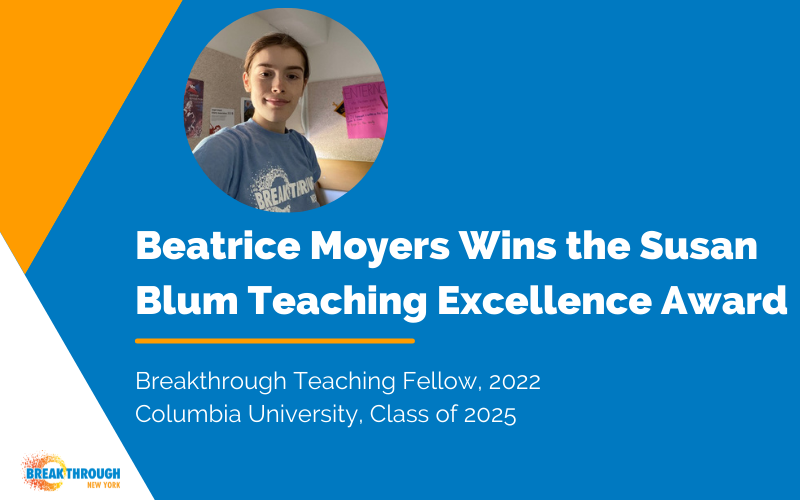Beatrice Moyers is a recipient of this year’s Susan Blum Teaching Excellence Award. She is a sophomore at Columbia University who is studying economics with a concentration in education studies. This summer, she taught 9th grade geometry and a speech and debate elective during her Teaching Fellowship.
Beatrice has a range of tutoring and mentoring experiences. She helped teach social emotional learning to 3rd graders and tutored with Reading Partners. She also volunteers as a college advisor with Matriculate.
Drawn to Teaching
School was always a special place for Beatrice. “What draws me to being a teacher [is] how meaningful school was for me,” she says. “Just being able to lose myself in learning and feeling like no matter what is going on in my life, I have this.”
As a Teaching Fellow, Beatrice wanted to encourage that same excitement with her students. It was important for her to introduce them to new ideas, and to build up their confidence so they felt like they were learning even if the material was challenging at first. “It’s such a foundational time in terms of developing your sense of self, and being able to carry that forward into high school,” she remarks. “I know how important that time was for me. I was just so gratified to be part of that for students.”
Beatrice connected with her class early on during the summer. This was true even when she missed a week of instruction and had to send in video recordings of her lessons. “When I got back, the students telling me they missed me, or that they liked my videos was really meaningful to me,” she remembers. “[I realized] how much I missed being a teacher and seeing my students every day.”
Anyone Can Be A Teacher
This award validates for Beatrice that there is not one specific way to be a teacher. She considers herself an introvert, and many teachers she knows have outgoing personalities. “I had a specific model in my mind of what ‘teacher’ meant, and I didn’t really know if I fit that model,” she explains. “[But] I didn’t have to put on some teacher persona in the classroom. I can just teach students the best I can and that would be enough.”
Even if Beatrice does not end up as a classroom teacher, this experience has been incredibly valuable for her. To work effectively in the education sector, she believes you must understand what it is like to be in a classroom and respond to students’ needs on a daily basis. You can then bring change to what they need outside of the classroom, such as by reallocating funding for schools or using data to more meaningfully track their academic progress.
Lessons Learned
One major takeaway Beatrice gained is that too much effort can be counterproductive and drain energy from where it’s needed. She learned this through the trial and error of juggling many responsibilities at once. “It can be really easy to pour too much of your attention into one thing,” she says. “That sweet spot [of balance] is really hard to find in life.”
Another vital lesson that Beatrice can apply to her life is the idea of being fully present. As a teacher, this means listening to what students tell you (and don’t tell you) about themselves so that you can understand them as people and keep them engaged. This notion is relevant for other roles too. “In any profession, you have to be present in the moment and listen to what other people are asking of you,” she says. “It’s so easy to be wrapped up in how you were perceived by other people that you’re not really thinking about [them]. It’s such an important life skill that will carry you everywhere.”


